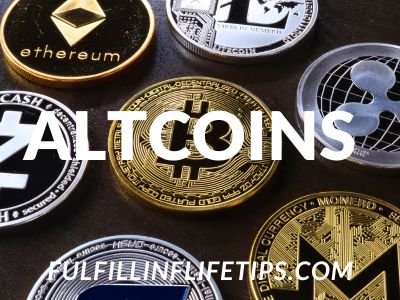Altcoins, or alternative cryptocurrencies, refer to any cryptocurrency other than Bitcoin.
Altcoins have emerged as a diverse and dynamic segment of the digital currency market. While Bitcoin remains the most well-known and widely adopted cryptocurrency, altcoins offer unique features, innovative technologies, and investment opportunities that make them a compelling choice for traders and investors.

In this article, we will delve into the concept of alternative coins, explore different examples, highlight their use cases, discuss their market caps, outline their benefits, and provide insights on how to invest in them. So, let’s dive in!
Understanding Alternative coins
Alternative coins represent a vast array of cryptocurrencies that aim to address specific challenges, introduce innovative features, or cater to niche markets.
These coins leverage blockchain technology to facilitate secure and decentralized transactions, similar to Bitcoin. However, they often incorporate additional functionalities, such as smart contracts or privacy features, to differentiate themselves in the market.
The Purpose of Altcoins
Alternative coins serve various purposes and address different challenges within the cryptocurrency ecosystem. While Bitcoin primarily aims to function as a decentralized digital currency, alternative coins often focus on specific functionalities or improvements.
- Some altcoins are designed for smart contracts and decentralized applications (DApps) like Ethereum, while others prioritize privacy and anonymity, such as Monero (XMR).
- Altcoins may also cater to scalability, speed, or governance models, showcasing the diversity of innovation in the cryptocurrency space.
Examples of Alternative coins
There are numerous altcoins available in the market, each with its unique features and use cases. Here are a few prominent examples:
- Ripple (XRP): Ripple offers a platform for fast, low-cost international money transfers and facilitates seamless transactions between financial institutions. Its native cryptocurrency, XRP, acts as a bridge currency, enhancing liquidity and reducing transaction costs.
- Litecoin (LTC): Created as a “lite” version of Bitcoin, Litecoin offers faster block generation times and a different hashing algorithm. It aims to facilitate faster transactions and serve as a digital silver to Bitcoin’s digital gold.
- Ethereum (ETH): Ethereum is more than just an altcoin; it is a decentralized platform that enables the development of smart contracts and decentralized applications (DApps). Ether (ETH) is the native cryptocurrency used for powering transactions and executing smart contracts on the Ethereum network.
- Cardano (ADA): Cardano focuses on security, scalability, and sustainability. It utilizes a peer-reviewed approach to develop its blockchain and aims to provide a secure platform for the execution of smart contracts and the development of DApps.
- Binance Coin (BNB): Binance Coin is the native cryptocurrency of the Binance exchange, one of the largest cryptocurrency exchanges globally. It offers benefits such as reduced trading fees, participation in token sales, and integration within the Binance ecosystem.
- Polkadot (DOT): Polkadot is a multi-chain platform that allows different blockchains to interoperate and share information. It aims to enable seamless communication and collaboration among various blockchain networks.
- Chainlink (LINK): Chainlink is a decentralized oracle network that connects smart contracts with real-world data and external APIs. It provides a reliable and secure way to bring external data onto blockchain platforms.
- Monero (XMR): Monero is a privacy-focused cryptocurrency that prioritizes anonymity. It utilizes advanced cryptographic techniques to obfuscate transaction details and ensure privacy for its users.
- Stellar (XLM): Stellar is a blockchain platform designed for fast and low-cost cross-border payments. It enables individuals and institutions to transfer value and issue digital assets in a secure and efficient manner.
- VeChain (VET): VeChain is a blockchain platform that focuses on supply chain management and product authenticity verification. It aims to enhance transparency and traceability in various industries, including luxury goods, agriculture, and healthcare.
These examples represent just a fraction of the altcoins available in the market, each with its unique features and use cases. It’s essential to conduct thorough research and analysis before considering any investment or involvement with altcoins.
Use Cases of Altcoins:
Altcoins serve various purposes, including:
- Utility Tokens: Many altcoins, such as Ripple and Ethereum, act as utility tokens within their respective platforms, enabling users to access and utilize specific functionalities.
- Privacy Coins: Altcoins like Monero (XMR) and Zcash (ZEC) prioritize user privacy by employing advanced cryptographic techniques to conceal transaction details.
- Stablecoins: Stablecoins, such as Tether (USDT) and USD Coin (USDC), aim to maintain a stable value by pegging their worth to a reserve asset, often a fiat currency like the US dollar.
- Governance Tokens: Altcoins like Maker (MKR) and Compound (COMP) grant holders voting rights and governance control over the platform’s decisions and future development.
Market Caps of Altcoins
The market cap of an altcoin refers to the total value of all its coins in circulation. It provides an indication of the coin’s popularity and relative size in the cryptocurrency market. Market caps can vary significantly, with some altcoins having multi-billion dollar valuations, while others are smaller in scale. As the crypto market is highly volatile, market caps can change rapidly. It’s important to conduct thorough research and keep track of market trends.
Benefits of Alternative Coins
Investing in altcoins offers several potential benefits, including:
a) Diversification: Altcoins provide an opportunity to diversify your cryptocurrency portfolio beyond Bitcoin. By investing in different altcoins, you can spread your risk and potentially capitalize on the success of specific projects.
b) Innovative Features: Altcoins often introduce novel features and technologies that have the potential to disrupt traditional industries. Investing in such coins allows you to be part of groundbreaking advancements and potentially reap the rewards.
c) Growth Potential: Some altcoins have experienced exponential growth, leading to substantial returns for early investors. By carefully analyzing projects, their teams, and their potential impact, you may identify altcoins with promising growth prospects.
How to Invest in Alternative Coins.
When investing in altcoins, it’s crucial to adopt a cautious approach. Here are some steps to consider:
a) Research: Thoroughly research altcoins, their teams, whitepapers, use cases, and market trends. Focus on understanding the potential risks and rewards associated with each investment opportunity.
b) Select Reliable Exchanges: Choose reputable cryptocurrency exchanges that support a wide range of altcoins. Ensure the exchange has strong security measures to protect your funds.
c) Create a Wallet: Set up a secure cryptocurrency wallet to store your altcoins. Hardware wallets, such as Ledger or Trezor, offer enhanced security compared to online or software wallets.
d) Portfolio Diversification: Allocate your investment across different alternative coins to reduce risk. Consider a mix of established projects and promising newcomers.
e) Monitor and Adjust: Regularly review your altcoin investments and stay updated with market trends. Adjust your portfolio based on your research and market conditions.
Conclusion
Alternative coins present an enticing opportunity for investors to diversify their cryptocurrency holdings, capitalize on innovative projects, and potentially generate substantial returns.
By understanding the various alternative coins available, their use cases, market caps, and benefits, as well as implementing a thoughtful investment strategy, you can navigate the world of altcoin investments with confidence. Remember to conduct thorough research and exercise caution while exploring this dynamic and rapidly evolving market.



